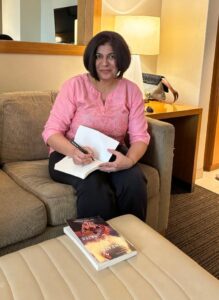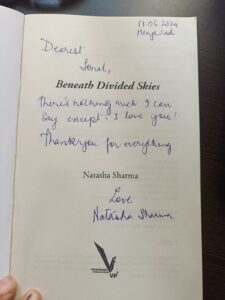

Book title – Beneath Divided Skies
Publisher – Vishwakarma Publications Pages – 262 pages Language – English
Genre – contemporary fiction
Author – Natasha Sharma
Available on – amazon.in
Purchase link – https://www.amazon.in/Beneath-Divided-Skies-Natasha-Sharma-ebook/dp/B0CZP9R18Z/ref=sr_1_1?crid=1TJAMSQHSY5CP&dib=eyJ2IjoiMSJ9.KFpEPaNUSTxRQsFEUyMpPj298Q7_QuvR8_nCGM5M6Tss-VSWZaar6XQSYUT7gQifd9T-Mt-LG42mPjPifV6iTg.hV8fB5UocPu85y71gfEIm_i1yeKUs_3Basl8nEoVa9Q&dib_tag=se&keywords=beneath+divided+skies&qid=1718429368&sprefix=beneath+divided+skie%2Caps%2C226&sr=8-1
**************************************************
About the author – Natasha Sharma is a freelance software developer who moonlights as a writer. She has been a voracious consumer of the written word since her childhood and is never without a book (or a Kindle) by her side. A true-blue feminist, she is passionate about creating awareness on gender inequality and other social issues. At the same time, her work displays a characteristic streak of cleverness and wit. Her stories have been published in several online magazines like eShe, Reading Frame, Thinking Pen, eFictionProject, Penmancy, amongst others. Her op-ed pieces and other articles can be found on leading web portals such as MoneyControl, SheThePeople, and Women’sWeb.
‘Beneath Divided Skies’ is her debut solo book. I was lucky enough to get my copy signed by the author.
About the book – “Through the art of storytelling, we can preserve our heritage, educate future generations, and inspire change.” – Philipp Humm
‘Beneath Divided Skies’, is based on the ‘Rescue and Restoration Act of 1949’, and explores the lives of social workers, women, and the hard choices they faced post the India-Pakistan partition in 1947. These social workers, the protagonists in the story, risked their lives and safety to rescue women from across the border and bring them back home. But, post 1947, for a woman who had been abducted, repeatedly violated, or forced to covert her religion; was a welcoming home or family left? Many such women returned pregnant or with young children that their families wanted nothing of! There were others who were branded by the shame of being violated … forever. They never outlived that shame and they were not accepted back into the familial fold. For such women, the author writes – //Pain at their loved one’s death, pain at the never-ending torture were crosses they’d always bear, whether rescued or not. It had become a part of their bodies, an unwanted appendage. //
I read this book at a slow pace, sinking into the traumatic period that the author has chosen to highlight. And yet, I could see that she has used commendable restraint in writing the gory scenes. It’s difficult, isn’t it, to restrain your hand, to hold back those tears in your heart, to keep your mind focussed when you write about a segment of history that left an undeniably deep wound that still smarts?! Will we, on either side of the border, or the Indian diaspora, ever recover from it?
The author writes – //The partition was nothing more than a line that Sir Cyril Radcliffe drew on a map, an arbitrary division of land, enforced by the powers that be. // Yet, this line had the power to inflict generations worth of pain and it transformed the lives of women, on either side of the border, into a living nightmare. It was the women who suffered the most at the hands of the marauding mobs. But thanks to a handful of brave social workers, not all those lost were forgotten. Not all those who were rescued, led broken lives. There were also some who were able to pick up the broken pieces of their lives. They found love, a family and built a future that was happy even if haunted by the shadows of the past – like Satya, the protagonist.
I appreciate the attention to detail that this book shows and that reflects the deep research that the author has done. Re-living someone else’s pain is also painful and I expect the pain of the stories that she researched, must have been raw, visceral and constant. It could not have been easy to bring out a traumatic era from our past and present it in a fictional form which ultimately ends in hope and peace.
The language of the book is easy to read and the author has taken care to include Punjabi, Urdu, etc words (prevalent during the period of 1947) into the text to lend an air of authenticity to the dialogues. Without those, this book would have been just another shallow story!! Kudos to the author for her research and initiative in trying to keep this authentic.
There is so much text available on the topic of partition that more often than not, the stories start to meld into one another. You know what will come next even before you finish what you are reading. That’s why, I am glad that the author has chosen the partition as a backdrop/a setting only. This book is not about the India-Pakistan partition. This book is also not about politics, religion or over-dramatization/milking the laurels off the back of the single most painful incident from our collective history. No! This book is about a tender love story. This book is about the grit, determination and fortitude of women. This book is about how what comes to pass as our past, should not be allowed to taint our future. This book is about constantly moving forward, evolving and adapting to whatever life throws at you. This book is about seeking and finding that elusive blanket of peace that we can snugly wrap around us like a warm duvet to both comfort and protect us.
This book is pure emotion!!
 Sonal Singh On Sonal's Table
Sonal Singh On Sonal's Table

